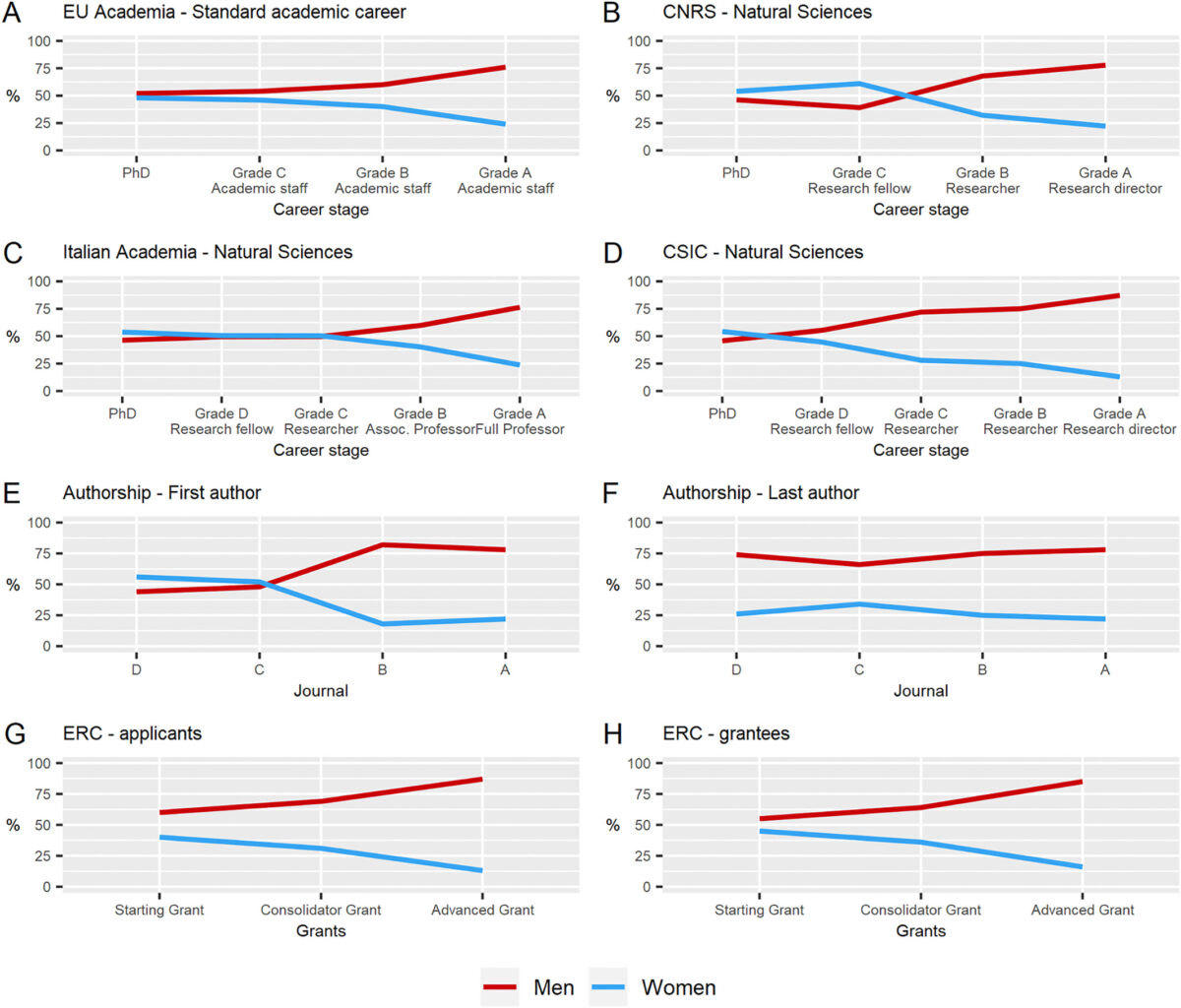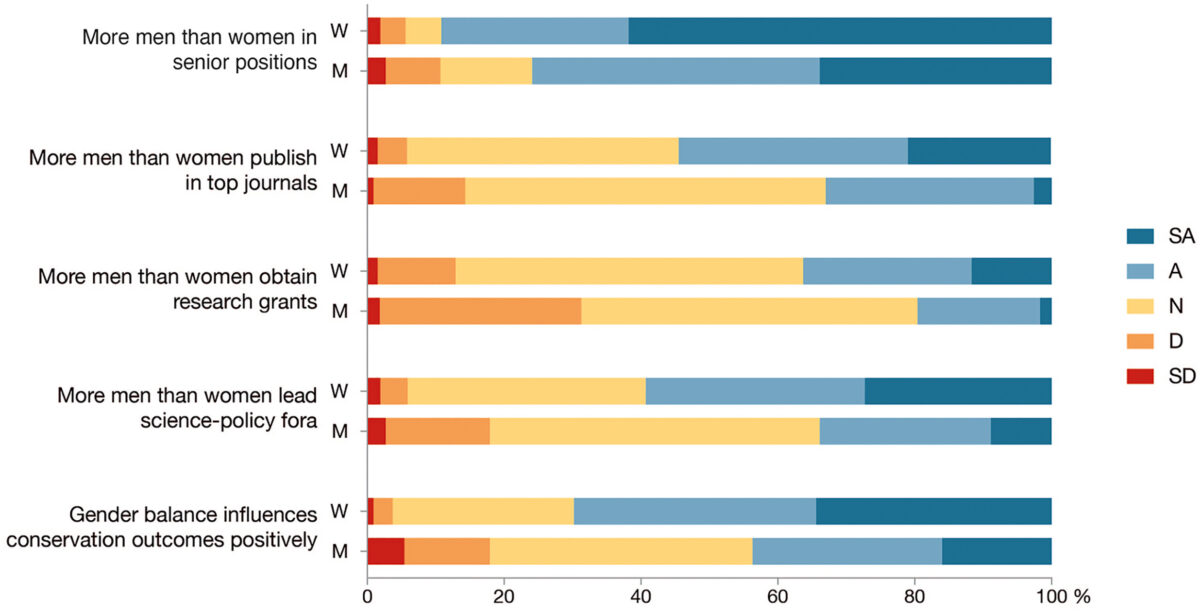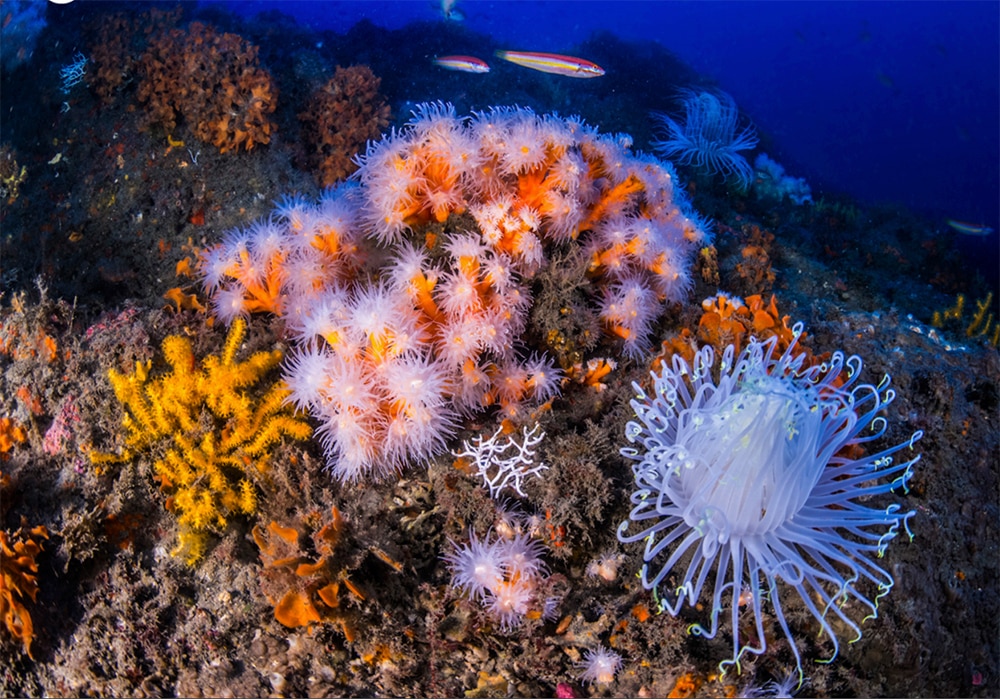Gender equality in marine science? Not yet…
Acknowledgments to Sylvaine Giakoumi
Gender equality is an unavoidable topic that has been defined as a United Nations goal for 2030 , along with women empowerment. Gender equality ensures that everyone has the same rights and responsibilities, with the same opportunities and resources, without preferential treatment according to gender. The question of gender equality has been raised in research for several years. At the CNRS, a French scientific research organization, since 2013, an analysis has been made of gender parity in the mathematics community, for example. But biology attracts more women than men, compared to other sciences (Anneke et al., 2019). What’s the current scenario of the presence of women in marine biology research? Unsurprisingly, many studies prove that it is far from a given. In particular, a team of 11 female researchers from around the world showed that gender biases are real and persistent (Giakoumi et al., 2021).
Researcher Sylvaine Giakoumi and her 10 co-authors conducted a study on the presence and visibility of women in the natural sciences in several research institutions in the European Union, with no possibility of distinguishing between positions in marine biology. The CNRS (Centre National de Recherche Scientifique) in France, the CSIC (Consejo Superior de Investigaciones Científicas – Superior Council of Scientific Research) in Spain and the Academia in Italy reported the proportions of men and women employed at different career levels*. While women slightly outnumber men in doctoral and post-doctoral positions (short term contracts), the trend is clearly reversed for permanent research positions. And the higher the hierarchical level, the fewer women there are in these positions (Fig. 1). These results agree with many other marine-related studies (Arismendi and Penaluna, 2016; Shellock et al., 2022; Legg et al., 2023). This raises the question of why women, who are equally numerous at the beginning of their doctoral studies, have a harder time obtaining a research position in Europe and do not move up the ladder afterwards. Eaton et al. (2020) have shown gender and ethnic biases in recruitment, which probably contribute to this trend.

Figure 1: Gender representation in some European Union research institutions (A), CNRS in France (B), Italian Academia (C), and CSIC in Spain (D). Adapted from Giakoumi et al. (2021).
Giakoumi et al. (2021) also analyzed scientific publications’ authorship of EU researchers in marine biology. They showed that women are less often present as first authors of publications**, especially in prestigious journals. These results are found worldwide and globally in biology and (Holman et al., 2016; Bendels et al., 2018). Ahmadia et al. (2021) found similar results in coral science papers both within and outside of OECD (Organization for Economic Cooperation and Development) countries. Women also receive fewer research grants (Giakoumi et al., 2021).
While these results are real and confirmed by multiple publications, the novelty of this article lies in the analysis of gender bias made by the authors. They asked researchers how they perceived the under-representation of women. They sent questionnaires to many researchers around the world and processed the answers, analyzing the answers of men and women. One surprising point is the number of respondents per gender. There were only 25% male respondents, although there are more male in the research field. This is a finding in itself: it seems that men take less time to respond to a gender survey than women (Giakoumi et al., 2021). And looking at the responses, it turns out that regardless of the question asked, men feel less gender inequality (Fig. 2), whether it is in the number of positions, publication in journals, or even their ability to obtain research grants.

Figure 2: Each bar shows the proportion of women (, n = 576) and men (, n= 188) who responded to each statement. SA = strongly agree, A = agree, N = neither agree nor disagree, D = disagree, SD = strongly disagree. Figure from Giakoumi et al. (2021).
Conclusion
The presence of women is minor in decision-making positions in marine biology, even though their leadership has been shown to lead to greater efficiency and more innovative measures in marine research (Blyhte and Cvitanovic, 2020). It has also been shown that various options could be implemented to increase the presence of women in marine biology research (Johannesen et al. 2022), and in biology in general. For example, Shellock et al. (2023) propose solutions based on the experience of women leaders in marine biology to increase the proportion of women in biology research. These solutions need to be adapted to the country and the cultural and political environment. For the sake of the oceans and their preservation, things must change, and women must have the same opportunities to reach positions of responsibility as men, based on skills and not gender. It should also be remembered that gender bias is compounded by nationality, ethnicity and age, making access to research even more difficult for some people.
*As female and male genders are the only ones available in the databases of the various European institutions, the authors were unable to include the other genders.
**The first author of a scientific publication is often the person who conducted the study and wrote the article. The other authors are named in order of contribution to the research. In some occasions (not always) the last author is the supervisor of the work.
Cited literature
Ahmadia G.N., Cheng S.H., Andradi-Brown D.A., Baez S.K., Barnes M.D. et al. 2021. Limited Progress in Improving Gender and Geographic Representation in Coral Reef Science. Frontiers in Marine Science. Vol 8. https://doi.org/10.3389/fmars.2021.731037
Anneke M.S., Höffler T.N., Keller M.M., Parchmann I. 2019. Gender differences in mathematics and science competitions: A systematic review. Journal of research in science teaching. Vol 56, issue 10. https://doi.org/10.1002/tea.21580
Arismendi I., Penaluna B.E. 2016. Examining diversity inequities in fisheries science: A call to action. Bioscience. Vol 66, issue 7. https://doi.org/10.1093/biosci/biw041
Bendels M.H.K., Müller R., Brueggmann D., Groneberg D.A. 2018. Gender disparities in high-quality research revealed by Nature Index journals. PLoS One. Vol 13, issue 1. https://doi.org/10.1371/journal.pone.0189136
Blythe J., Cvitanovic C. 2020. Five Organizational Features That Enable Successful Interdisciplinary Marine Research. Frontiers in Marine Science. Vol 7. https://doi.org/10.3389/fmars.2020.539111
Eaton A.A., Saunders J.F., Jacobson R.K., West K. 2020. How Gender and Race Stereotypes Impact the Advancement of Scholars in STEM: Professors’ Biased Evaluations of Physics and Biology Post-Doctoral Candidates. Sex roles. 82.
Giakoumi S., Pita C., Coll M., Fraschetti S., Gissi E., Katara I., Lloret-Lloret E., Rossi F., Portman M., Stelzenmüller V., Micheli F. 2021. Persistent gender bias in marine science and conservation calls for action to achieve equity. Biological conservation. Vol 257. https://doi.org/10.1016/j.biocon.2021.109134
Holman L., Stuart-Fox D., Hauser C.E. 2018. The gender gap in science: How long until women are equally represented? PLoS Biology. Vol 16, issue 4. https://doi.org/10.1371/journal.pbio.2004956
Johannesen E., Ojwala R.Au., Rodriguez M.C., Neat F., Kitada M., Buckingham S., Schofield C., Long R., Jarnsäter J., Sun Z. 2022. The Sea Change Needed for Gender Equality in Ocean-Going Research. Marine Technology Society. 3:18-24. https://doi.org/10.4031/MTSJ.56.3.6
Legg S., Wang C., Kappel E., Thompson A. 2023. Gender Equity in Oceanography. Annual Review of Marine Science. Vol 15:15-39. https://doi.org/10.1146/annurev-marine-032322-100357
Shellock R.J., Cvitanovic C., Mackay M., McKinnon M.C., Blythe J. et al. 2022. Breaking down barriers: The identification of actions to promote gender equality in interdisciplinary marine research institutions. One Earth. Vol 5, issue 6. https://doi.org/10.1016/j.oneear.2022.05.006
Shellock R.J., Cvitanovic C., McKinnon M.C., van Putten I.E., Blythe J. et al. 2023. Building leaders for the UN Ocean Science Decade: a guide to supporting early career women researchers within academic marine research institutions. Vol 80, issue 1. https://doi.org/10.1093/icesjms/fsac214
Ces articles pourraient vous intéresser

How do traditional fishermen understand scientific charts?
Context Fisheries monitoring and collaboration with local fishermen are fundamental aspects for effective management that would lead to local and sustainable benefits. The presentation of…
26 May 2023
Sponsor Spotlight : Matthias and Trent from Eco Elio
Tell us a bit about yourself 🙂 We are Matthias and Trent – cofounders and managing directors from eco elio! We are an innovative sunscreen…
25 April 2023CALL FOR PROJECT PROPOSALS
For the development of a coral reef conservation programme in partnership with Coral Guardian. About Coral Guardian Coral Guardian is a French non-profit that was…
13 April 2023
Launch of the first participatory marine conservation project of the Mediterranean sea
We’re now located in the Mediterranean Sea with the launch of the first participatory marine conservation project in this region of the world. This project,…
17 February 2021
